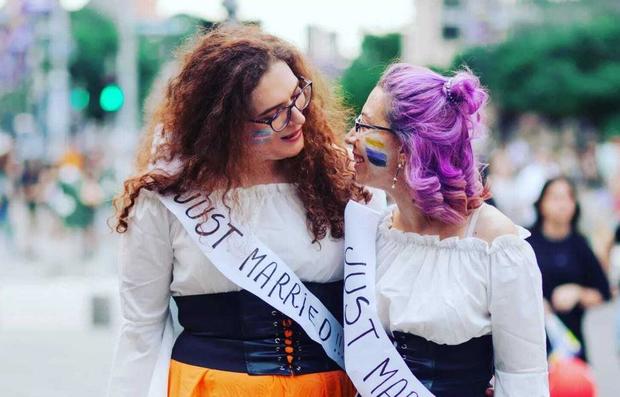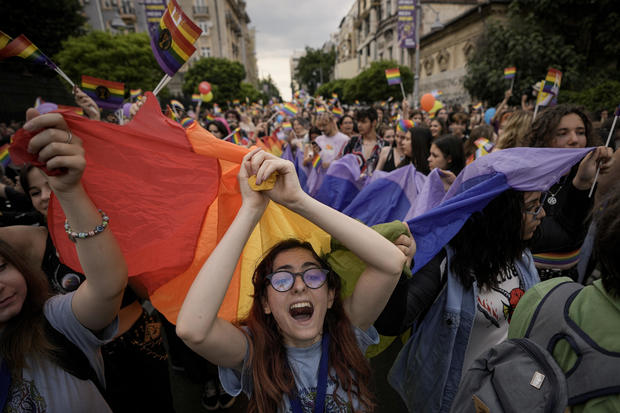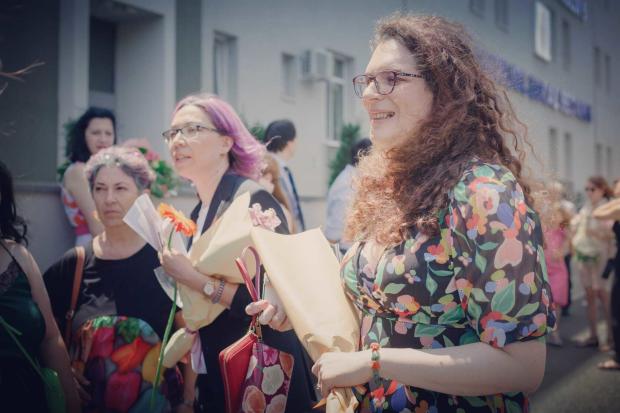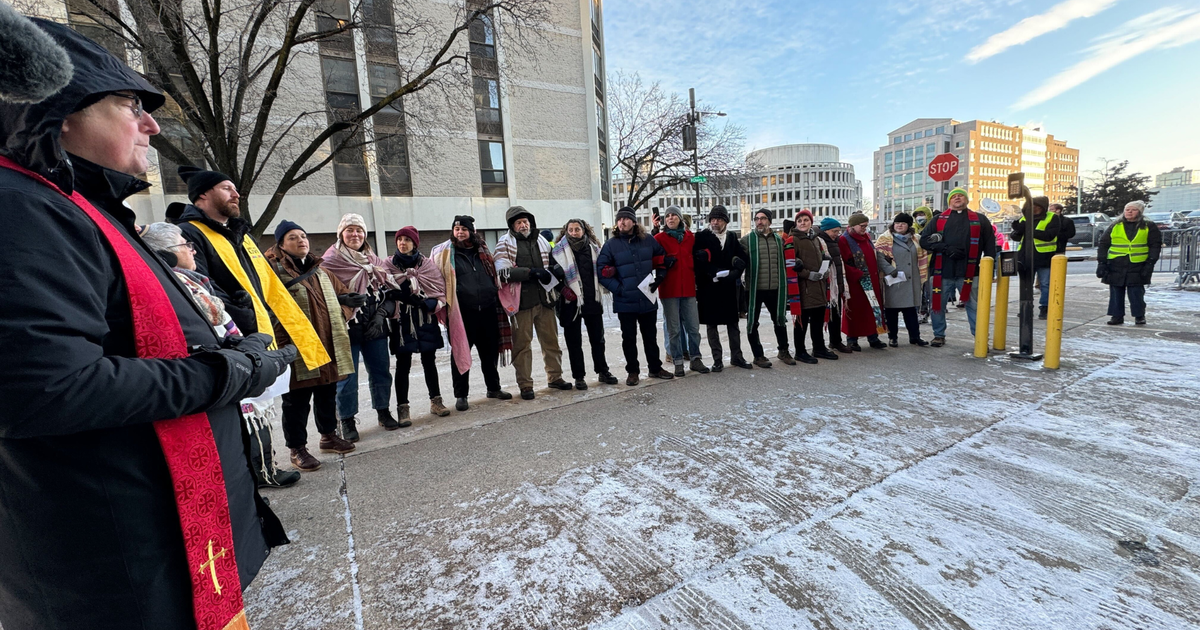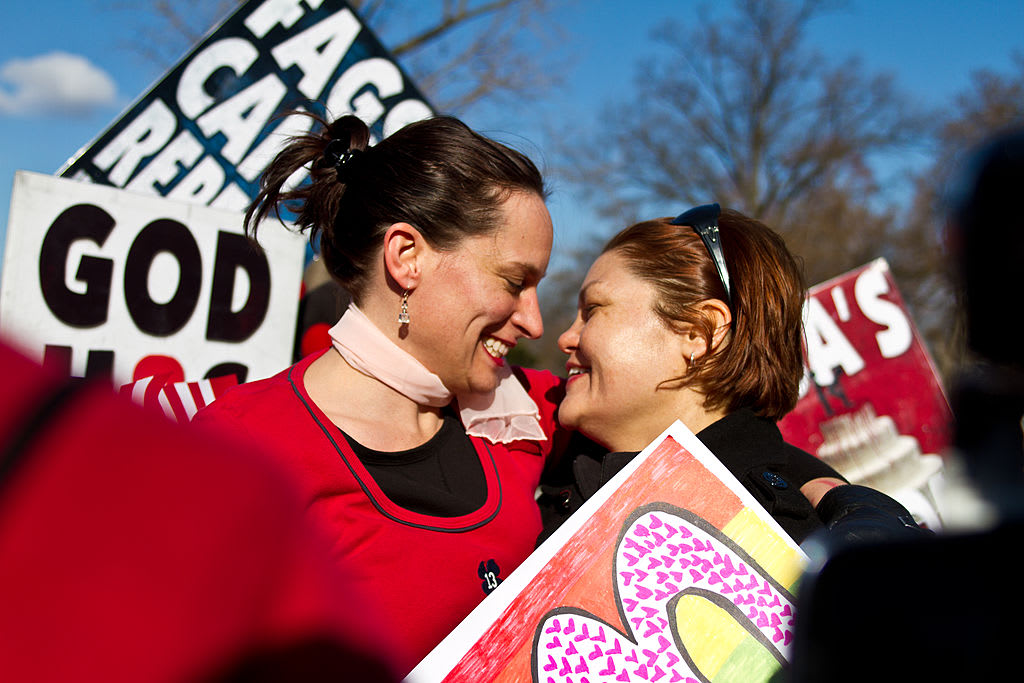Romania may follow Russia in banning LGBTQ "propaganda," but not if its first pair of married women can help it
Just as thousands of protesters hit the streets in Romania to say "I don't" to a recently proposed law against LGBTQ "propaganda", marching in protest against the bill, two women took advantage of an oversight in the country's strict marriage laws to say "I do."
On July 9 — the day of the largest-ever Bucharest Pride March in history — Evie and Gia were married at a civil registry office in the Romanian capital. It was the first wedding between two women in Romania, where same-sex marriage is banned.
"We decided to do this on Pride March day because we thought it's a day of celebration and protest for our community, and our marriage was a bit of both," said Evie, a 37-year-old software engineer. Evie, who is transgender, has not yet changed her gender on her government-issued ID, so their marriage was legally recognized as being between a man and a woman.
"I strongly believe that more representation in media and being out and public is one of the things that can significantly help the LGBTQIA+ community right now," Evie told CBS News. "At the same time, a lot of folks in our community can't afford to do that for various reasons, which is why I think it's even more important for those of us who can afford it — financially, psychologically, etc. — to be out and vocal."
Their wedding ceremony took place just before more than 15,000 people gathered in the Bucharest to defend LGBTQ rights as lawmakers push for the new law that would ban any discussion of homosexuality or gender identity in virtually all public and private spaces, including schools, workplaces, the internet and other mass media.
"I think it's very important for people to realize that visibility is not propaganda, but rather it's education, or a fair reflection of reality," said Gia, 35, a personal development counselor and philosophy student.
Seven parliamentarians from the Democratic Alliance of Hungarians in Romania (UDMR), Romania's ethnic Hungarian minority party, proposed the bill in February. After being adopted without a vote by the Romanian Senate in May and receiving the backing of the Romanian Human Rights Commission, the bill is now expected to come up for a vote in the parliament's lower chamber, the Chamber of Deputies, later this year.
Hungary, Romania's neighbor to the west, adopted a similar law in June 2021 prohibiting the distribution of content deemed to promote homosexuality and gender change to people under 18 in school sex education, films or TV commercials. LGBTQ activists have said that both Romania's bill and Hungary's law are modeled on anti-gay legislation enacted by Russia in 2013. That law bans the promotion of any information about "non-traditional sexual relations" to children.
In June, Russian lawmakers proposed expanding the country's law to apply to adults as well as children. The push for even harsher laws has fueled "visible unease and fear among the Russian LGBT+ community," Dilya Gafurova, head of the Russian LGBTQ rights organization CF Sphere, told CBS News.
Gafurova said requests for legal assistance to the organization — mainly on immigration matters from LGBTQ individuals in Russia — had increased nearly six times between February and July of this year compared to the same period last year. In addition, 4,700 requests for psychological assistance came through to their hotline this year. She said suicidal thoughts among Russian LGBTQ people were becoming "frighteningly common."
Among other concerns in Russia, Gafurova said LGBTQ families with children have expressed rising concern over their kids' futures.
In the context of Russia's attack on Ukraine, she said queer Russians who have a male gender marker on their passports have also grown increasingly afraid of being drafted into the army, both because they don't want to take part in the war and because there's rampant transphobia and homophobia in the Russian army.
Romanian LGBTQ leaders worry the proposed bill puts their country on a similar path.
"We believe this anti-LGBT bill is extremely dangerous as it questions basic democratic principles and rule of law in Romania — it is about freedom of speech, it is about protection of minorities and specifically the LGBT community," said Vlad Viski, the executive director of MozaiQ, a leading LGBTQ organization in Romania. "If passed, this bill would bring Romania closer to Russia and its undemocratic regime and put the country on the trajectories of Poland and Hungary."
"What we are seeing in Romania at the moment is yet another illiberal attack against the LGBTQIA+ community," said Teodora Ion-Rotaru, executive director of ACCEPT, the first non-governmental human rights organization in Romania. "But the community and the activists are not backing down."
The proposed law has drawn international opposition, too. Leaders from the European Parliament's LGBTI Intergroup called on Romanian politicians to uphold EU values by rejecting the legislation.
U.S. Senator Tammy Baldwin, a Democrat and the country's first openly gay senator, met with leaders from MozaiQ and ACCEPT to discuss measures to reduce discrimination in Romania. She has also lobbied Romanian parliamentarians to oppose the bill, which she warns will unnecessarily harm members of the LGBTQ community, strain U.S.-Romanian relations, and potentially cause unneeded fracture in the coalition supporting Ukraine.
Baldwin told CBS News that she plans to meet with the Romanian ambassador to the U.S. to continue to advocate against the bill.
"Regardless of where someone lives in the world, they deserve the dignity to live free from discrimination based on who they are and who they love," she said.
While homosexuality has been decriminalized in Romania since 2001, same-sex couples are neither allowed to marry nor enter into civil unions, and transgender people are not able to change the gender on their IDs without having to pursue legal action, as there is no administrative procedure to accomplish this.
Evie said it was exactly because of these restrictions that she was able to marry Gia, as their relationship was deemed heterosexual on paper and allowed to proceed. She called it "one of those instances where two wrongs do make a right."
The couple told CBS News they still endured discrimination at their ceremony, as the local official who carried it out tried to put an end to the proceedings multiple times. At one point, the official insisted that Evie change out of her dress and into clothing that conforms with the gender listed on her ID. The official also said Evie and Gia were not allowed to take any photos of the ceremony.
Evie said she threatened legal action, arguing there were no legal grounds upon which the official could refuse to marry them. Shortly after, Evie and Gia were married, and they chose to end their celebration at the Pride March.
"LGBT people exist," Gia said. "We're physicists and chemists, rockers and hippies, businessmen and artists, teachers and students."
Evie and Gia still don't know what will happen with the status of their marriage if and when Evie manages to legally change her gender. Until then, they — along with the rest of Romania's LGBTQ community — intend to keep fighting for their right to simply exist.
